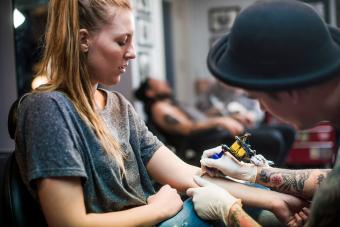
Are you thinking about getting a new lip piercing? There are so many different styles to choose from. But styles aren't all you need to think about. You should ask yourself some key questions and do some research before you undergo the procedure. For example, are lip piercing safe?
Any type of piercing presents certain challenges and risks to the body. Facial piercings and lip piercings, in particular, present some additional concerns you need to be aware of before you get pierced. Understanding these potential complication and finding a qualified piercers can help you to avoid them and have a healthier, longer-lasting piercing.
Possible Lip Piercing Complications
A lip piercing is where a stud, barbell, or hoop is inserted into the upper or lower lip area. Many people have lip piercings that have little to no problems at all. This may be due in part to care taken by both the piercer and by the wearer. But others have developed problems or complications which range from mild to serious.
Problems with your lip piercing may appear almost immediately, or they may develop months or years after the piercing was performed. Many of the effects of lip piercings take time to develop, so they may go unnoticed in the early stages. It is important to know the signs to look for so that you stay healthy after getting your lip pierced.
Infection
Anytime you get a new piercing, infections are a possibility. That's why proper aftercare and sterilization techniques are so important. The Balkan Journal of Stomatology suggests that infections are common after oral or perioral piercings. Typically, this is due to the variety of bacteria in a person's mouth.
The American Dental Association outlines specific signs of infection to watch for. If you experience any of these symptoms, contact your healthcare professional.
- Chills
- Fever
- Red streaks at the piercing site
- Severe swelling
Nerve Damage
Your lips, cheeks, and tongue are full of different nerves. Therefore, The Open Dentistry Journal suggests that nerve damage can occur if the piercer does not place the jewelry properly.
When seeking a piercer, check out recommendations, reviews, and experience. Look for a piercer with several years of experience or with membership in associations like the Association of Professional Piercers.
Increased Saliva
A piercing involves placing a foreign in your mouth. So, your body is going to react. For instance, the presence of a foreign object in your mouth may cause your salivary glands to produce excess saliva.
The Open Dentistry Journal notes that several studies have shown an increase in saliva with oral piercings. However, the Balkan Journal of Stomatology suggests that this symptom does ease with time.
Keloids, Cysts, and Scar Formation
Most lip piercings don't produce excessive scarring. But that doesn't mean it's not a possibility. The Open Dentistry Journal says that that oral and perioral piercings can cause hyperplastic scarring and cysts. The study also notes that some patients have experienced ulcers from the friction of the jewelry.
Additionally, if you are prone to keloids or to scarring, the site of the piercing may develop a raised scar. You'll want to speak with your healthcare professional about scar or cyst formation and treatment options.
Blocked Airway
Swallowing your oral jewelry is rare. However, if the jewelry becomes loose in your mouth, you may swallow it, or more seriously, it may block your airway. This is especially true with magnetic piercings, says The Open Dentistry Journal.

Tooth and Gum Problems
Depending on where your lip piercing is, it can come in constant contact with your gums and teeth. For example, the back of a labret piercing can constantly rub against your lower teeth and gums. Due to this friction, there are a number of possible related issues that could occur, according to The Open Dentistry Journal and Australian Dental Journal.
- Gum erosion and recession.This is caused when your jewelry rubs against the gums. Your gums may shrink or recede from the spot your jewelry comes in contact with them.
- Sensitive teeth. Teeth sensitivity is another by-product of gum recession. As the gums recede, the nerves of the teeth become exposed and sensitive.
- Tooth chipping, erosion, and loss. You might not think about how much your jewelry comes in contact with your teeth, but it could be every time you move your mouth. That clicking and friction on the teeth can lead to chipping and wear against the enamel. In addition to gum loss, you can have tooth decay and loss.
Disease Transmission
While licensed professionals are usually diligent about sterilizing their needles and equipment, getting a lip piercing from someone not licensed may lead to bloodborne diseases. According to The Open Dentistry Journal, oral piercings carry a potential risk for diseases such as herpes simplex virus and hepatitis B and C without proper sterilization.
In order to avoid this danger, educate yourself about sterile procedures and make sure any piercer you choose is using them. This includes checking up on the shop to see how it has fared in recent health inspections.
Remember, while lip piercings are frequently considered by dentists and physicians to be less dangerous than tongue piercings, there are dangers, problems, and concerns involved. Speak to your piercer and dentist about steps you can take to help minimize or prevent these problems from taking place. Make an informed decision about whether to get a lip piercing and follow proper aftercare instructions for any piercing to help ensure it makes exactly the statement you are after.







